I grew up assuming two things about the book of Psalms, and they both turned out to be wrong:
- Psalms is the longest book of the Bible (see what the longest book actually is).
- Psalms was written by David.
David didn’t write the book of Psalms. In fact, David only wrote about half of the Psalms—73 out of all 150, to be precise (though the Latin Vulgate and Septuagint credit a few more to him).
He wasn’t even the one who put the whole collection together: some were written hundreds of years after he died!
So that leaves us with a few questions:
- How do we know who wrote the Psalms?
- How many people besides David contributed to Psalms?
- Which psalms were written by David?
- Which psalms were written by the others?
The good news is that we can find the answers using the psalm titles, some cross-references, and a little math. Let’s tackle these questions one by one.
How do we know who wrote the Psalms?
Old Testament authorship can be tricky, but Psalms makes it pretty easy for us in most cases. While most of the Old Testament books don’t explicitly state their authors—we’re looking at you, Job!—whoever put the book of Psalms together labeled the Psalms by author.
When look up a Psalm in your Bible, you’ll usually see something like this:
While the italic headings in this example were added long after Psalms was written, the line, “A Psalm of David” was actually written in the Hebrew manuscripts. It’s kind of like the hymnals you find in churches—they give you the song’s title and the name of the guy or lady who wrote it.
So for most of these Psalms, you can tell whom they recognized as author way back when.
If you’re one of those do-it-yourself Bible-study people (or, as I call them, Home Depot Christians*), you can quit reading this post right now. Just go look up all 150 psalms, record who wrote which ones, and then do the math on your own. But if you don’t have that kind of time on your hands, good news! I did all that dirty work for you . . . with a little help from Logos Bible Software. =)
*This is a lame joke. I know. But I promise I made it up right as I was typing that sentence. It’s funny via spontaneity—trust me on this.**
** Four years later: I don’t like this joke and I don’t think it was funny. But I’m leaving it up as a monument to my own fallible sense of humor.
How many people (besides David) wrote the Psalms?
When you go through all the Psalms and note each heading, you get a long list of Psalmists. In fact, Psalms names more contributors than any other book of the Bible.
The Psalms name more than seven authors, including five individuals and two families (who wrote psalms over the centuries). Here’s the spread:
- David: the God-anointed king of Israel. I’m sure you’ve heard of this guy—he killed Goliath. You can read his story in the books of First and Second Samuel.
- Asaph (the family): Asaph and his sons were ordained by David to lead the people in worship, and were recommissioned when Nehemiah rebuilt Jerusalem (1 Ch 25:1; Neh 7:44; 12:46–47).
- The sons of Korah (another family): back in the book of Numbers, a man named Korah rebelled against Moses and Aaron—and God caused the earth to swallow him up. His sons survived, though (Nu 26:11), and continued to serve in the house of the Lord. They share one psalm (Ps 88) with the wise man Heman.
- Heman: not to be confused with He-Man. He was a wise man who co-authored the eighty-eighth psalm with the sons of Korah. His brother Ethan (1 Ch 2:6) wrote a psalm, too.
- Solomon: this king is better known for his work in Proverbs, Ecclesiastes, and Song of Solomon. He’s David’s son, and inherits his father’s throne.
- Moses: he wrote more words in your Bible than any other human. Most of those words are in the books of Genesis, Exodus, Leviticus, Numbers, and Deuteronomy. Moses also wrote a psalm.
- Ethan the Ezrahite: we don’t know much about Ethan, except that he was a famous wise man. So famously wise, in fact, that the Bible makes a point to tell us Solomon was even wiser (1 Ki 4:31). Sorry, Ethan—but hey, somebody needs to get the silver medals.
The remaining 50 “orphan psalms” aren’t credited to any one author. One nameless nobody could have written all 50, but there’s a better chance that they were written by many people over many years.
Which psalms did David write?
So we know David wrote the most of the psalms—73 that we’re sure of. These ones are his, specifically:
- Psalms 3–9
- Psalms 11–41
- Psalms 51–65
- Psalms 68–70
- Psalm 86
- Psalm 101
- Psalm 103
- Psalms 108–110
- Psalm 122
- Psalm 124
- Psalm 131
- Psalm 133
- Psalms 138–145
To be fair, the Septuagint (the Greek translation of the Old Testament) and the Latin Vulgate ascribe a few more psalms to David, which brings the count as high as 85.
Which psalms were not written by David?
The rest, of course! =)
I’m just being difficult. Here’s the breakdown of all the psalms written by people other than David.
The family of Asaph wrote 12 psalms:
- Psalm 50
- Psalms 73–83
The sons of Korah wrote 11 psalms:
- Psalm 42
- Psalms 44–49
- Psalms 84–85
- Psalms 87-88
Heman the Ezrahite coauthored Psalm 88 with the sons of Korah.
Solomon wrote two psalms:
- Psalm 72
- Psalm 127
Moses wrote Psalm 90.
Ethan the Ezrahite wrote Psalm 89.
Did you know that the Psalms isn’t the only place where songs show up in the Bible? There are dozens of other songs scattered throughout Scripture. Here’s where you can learn about all of them.
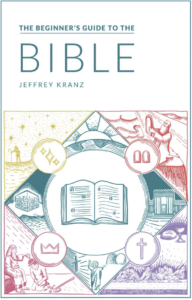 I wrote The Beginner’s Guide to the Bible to give people an overview of what the Bible is, what it’s for, and what it’s all about. I explore how each of the Bible’s 66 books fit into the big picture, and you’ll walk away with enough knowledge to have a thoughtful conversation about the Bible with a pastor, an atheist, or anyone else.
I wrote The Beginner’s Guide to the Bible to give people an overview of what the Bible is, what it’s for, and what it’s all about. I explore how each of the Bible’s 66 books fit into the big picture, and you’ll walk away with enough knowledge to have a thoughtful conversation about the Bible with a pastor, an atheist, or anyone else.
David had a lot of help
Just by looking at these numbers, we see that David wrote more psalms than anyone else, but God used a wide range of talented musicians over hundreds of years to write these pieces back to Him.
We can’t neatly attribute Psalms to David, but I think that makes the book of Psalms a lot more interesting.
Don’t you?
Oh, and one more thing: the Jews worshiped with songs written over a period of 700 years—and here we call 200-year-old hymns “old-fashioned.”
Related pages:
- See a summary of the book of Psalms.
- Learn more about all the authors who wrote the Bible.
- Check out a song based on the text of Psalm 1.
- See songs for each of the Psalms.
I used my favorite Bible study tool, Logos Bible software, to do research that made this post possible. If you're a Bible geek like me, you might want to check it out.

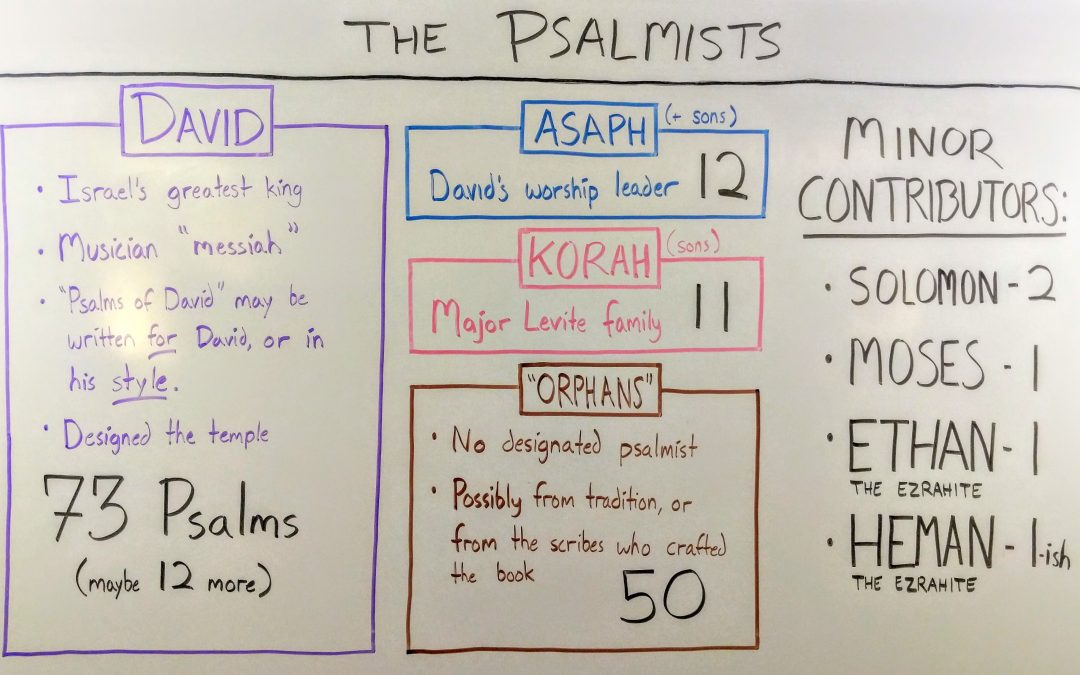
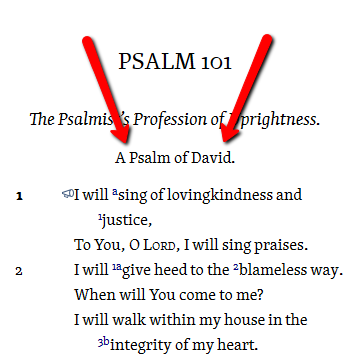
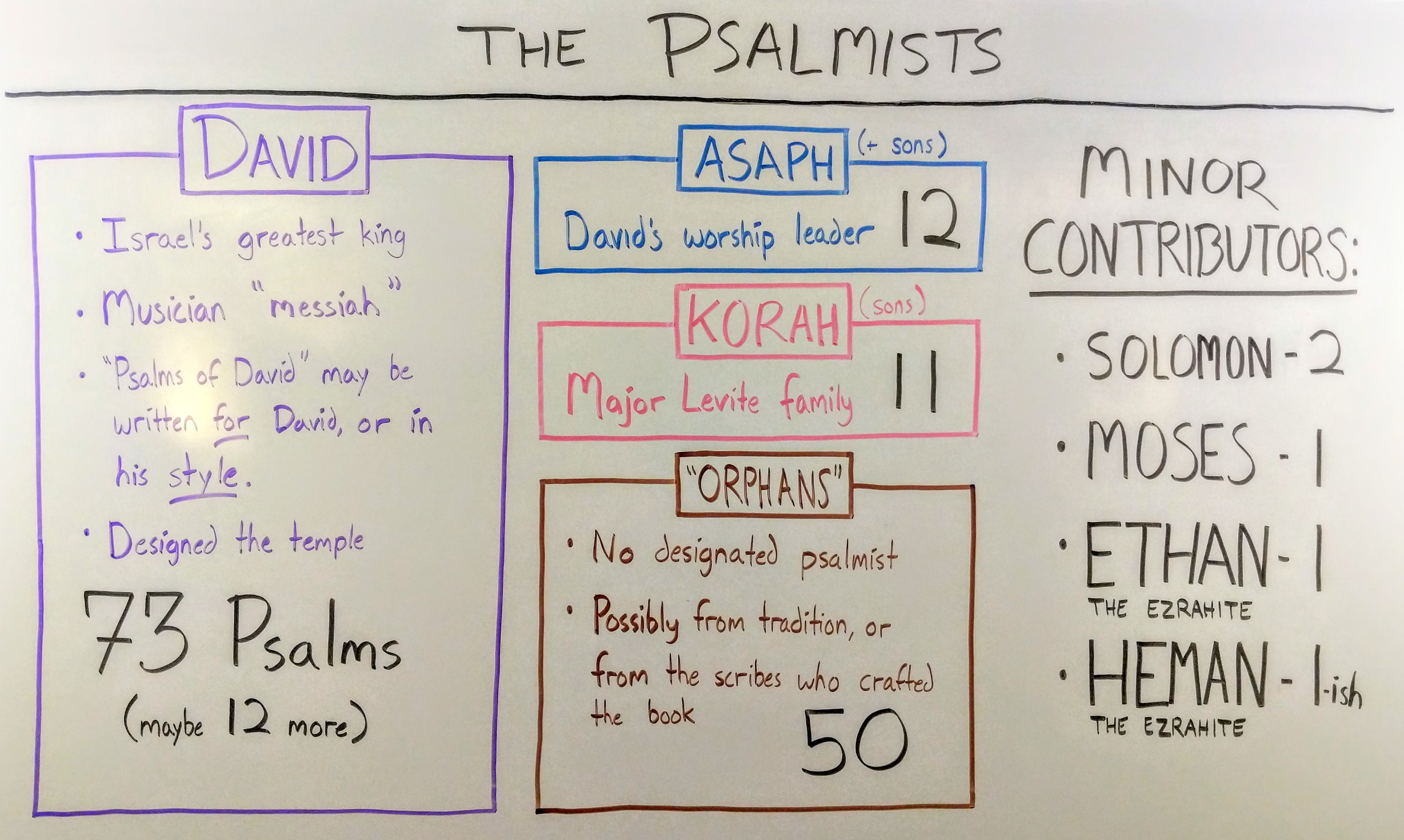
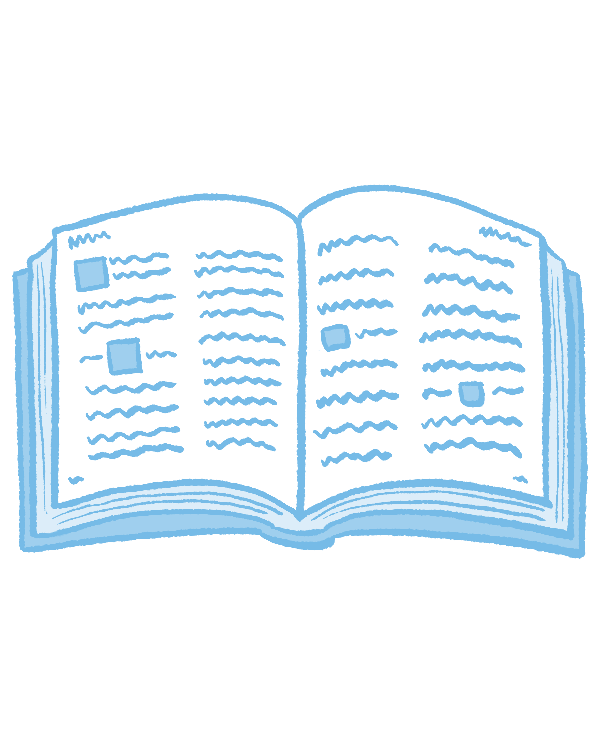


Great work!
I’m just wondering, does any of the songs , make mention of or reference to the enemy, satan, the devil, etc.
There are MANY references to enemies in the Psalms, but no reference to the modern Christian idea of Satan. God does take the other gods of the world to task in Psalm 82, when he accuses them of letting humans oppress each other, and tells them that in time, he will remove them from their positions. By the time of Jesus, the Jews seem to believe these gods have thrown in with a single “devil,” or “Evil One,” who tempts Jesus in the wilderness. This Satan character, Jesus, John, and Paul seem to believe he has power over all the kingdoms of the earth (Luke 4:5–7; John 12:31; 2 Corinthians 4:4; Ephesians 2:1–2; 1 John 5:19).
So in some ways, it’s possible that this character was referenced in the Psalms. But even so, it’s not directly.
Good observation about satan in the TNK and how various ideologies varied from book to book covenant to covenant.
I love God’s Word. I have a bit of knowledge of who wrote it.
However, my goal is to do what it says to do. Psalm 119 is an amazing read, but also requires a serious change in our lives and a deeper commitment to do what it says. I love this part. Teach me(33) Give me (34) Make me(35) Revive me(37,40).
I love the Psalms as prayer. Never thought of the authors. Thank you.
Love your chart! Thank you. I’ve been diving deep into Psalm 119, and believe it along with other psalms were post-exile writers, and Psalm 119 in particular, may have been written by Ezra. Do you have any thoughts on this?
I am also starting a deep dive in Psalm 119. One of my favorites. The Chronological Bible has it penned in Nehemiah 13 so Ezra is a possibility for sure. I would love to read your thoughts on the Psalm. Will you be writing on this in future?
Currently I’m writing a blog on Psalms at psalmtreasures.wordpress.com. I’ve finished the first of a 3 part series on Psalms 119, but have chosen not to publish at this time. Thanks for asking
Who wrote psalm 129 please?
That’s an orphaned psalm.
awesome! thanks for this input, God Bless you my brother
Thanks for having a religion blog with a sense of humor. I’m afraid my humor would not go over well with people, which is why my blog on faith only livens up when I can mix flying into it.
I recommend reading, “How Came The Bible” by. Edgar Goods peed (1958). He was a Christian Pastor who did all the research to confirm what parts remain in their original form, what’s been taken out, and what’s been added to it.
Psalms 116 is such delight to read❤
Actually, at least 10 chapters are from Moses! Read the original and you’ll know. Tefilah leMosheh – A prayer of Moses includes Tehillim (Psalms) 90-100. LeDavid mizmor – A song of David is Tehillim 101.
Can you show that the Hebrew morpheme translated “of” (as in “a psalm OF David” and in “OF the sons of Korah) is in fact the same? I wonder because some people say that the Sons of Korah psalms were not written by them but FOR them (which is apparently a reasonable alternative translation of the subtitle phrase). I’m with you though—it says right there at the beginning who wrote it. Those “of David” were written by him. Those of someone else… If it’s the same morpheme/word, then it doesn’t seem very well motivated to translate it “of” for David but “for” for the sons of Korah.
Spurgeon amusingly said of Psalm 42 (of the sons of Korah): “We could sooner doubt the authorship of the second part of Pilgrim’s Progress than question David’s title to be the composer of this Psalm.” :-)
(BTW, wasn’t Heman himself one of the sons of Korah?)
Idk
I agree that the preposition is most likely different in the original Aramaic script. Perhaps if someone has an ancient Torah, the Yiddish would clear this up. However, the Qur’an recognizes David as a Prophet of God and attributes the Psalms to him.
In study of Bible can Quran be considered a reference text
Thank you very much for this post…to GOD be the glory! Psalms 2 and 95, even though they don’t have David’s name as the author, in the New Testament, the authors attributed them to David. Acts 4:25 attributes David as the author of Psalm 2 – “who by the mouth of Your servant David have said: ‘Why did the nations rage, And the people plot vain things?” (NKJV) and Hebrews 4:7 also attributes David as the author of Psalm 95 – “again He designates a certain day, saying in David, “Today,” after such a long time, as it has been said” (NKJV).
I like (and appreciate) how you provide scriptural citation for every point that you make, however menial, instead of lazily expecting your readers to believe in a syndicated opinion. Keep up the honest work!
When God added 15 more years to Hezekiah’s life, he honored God with 15 psalms which are called psalms of degrees. 10 of those psalms were penned by him. 4 by David and 1 by Solomon. He called them Psalms of degrees because it was the sign given to him by Isiah that the weather would instantly change by 10 degrees.
Can you site this information?
the 10 degrees refers to time, not weather: the retreating of the sun as seen by the shadow on the sundial. see last verse below, from 2 kings 20: 8-11 (new king james version nkjv).
8 And Hezekiah said to Isaiah, “What is the sign that the Lord will heal me, and that I shall go up to the house of the Lord the third day?”
9 Then Isaiah said, “This is the sign to you from the Lord, that the Lord will do the thing which He has spoken: shall the shadow go forward ten degrees or go backward ten degrees?”
10 And Hezekiah answered, “It is an easy thing for the shadow to go down ten [a]degrees; no, but let the shadow go backward ten degrees.”
11 So Isaiah the prophet cried out to the Lord, and He brought the shadow ten [b]degrees backward, by which it had gone down on the sundial
Hezekiah also wrote 10 psalms to
worship the Lord and you did not mention that.
Interesting post. I was unaware of the discrepancies among the manuscripts as to David’s authorship.
I liked your note on the psalms. Very up to date and readable. Bill
Thanks, Bill! Glad you enjoyed it. It’s a really interesting book, isn’t it?